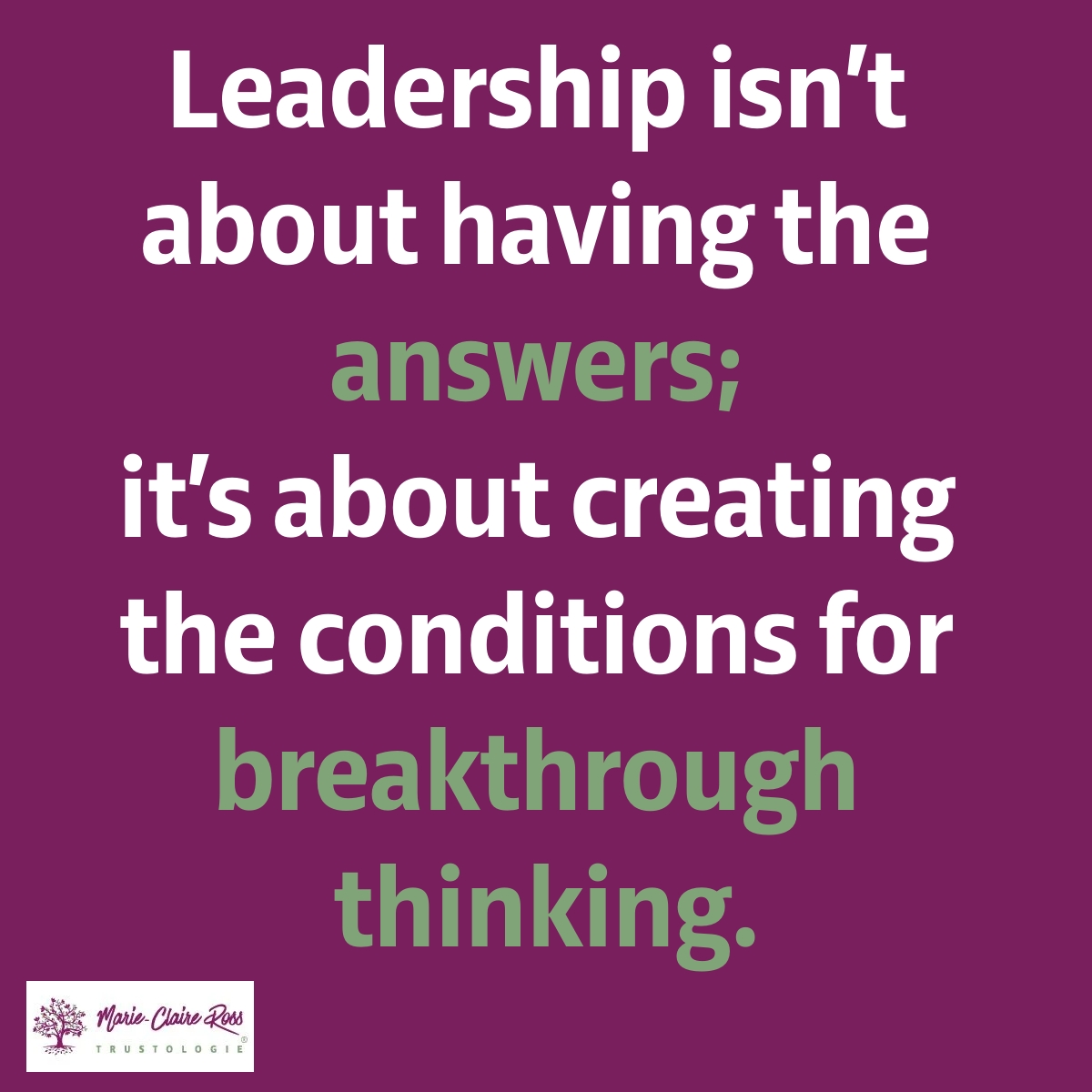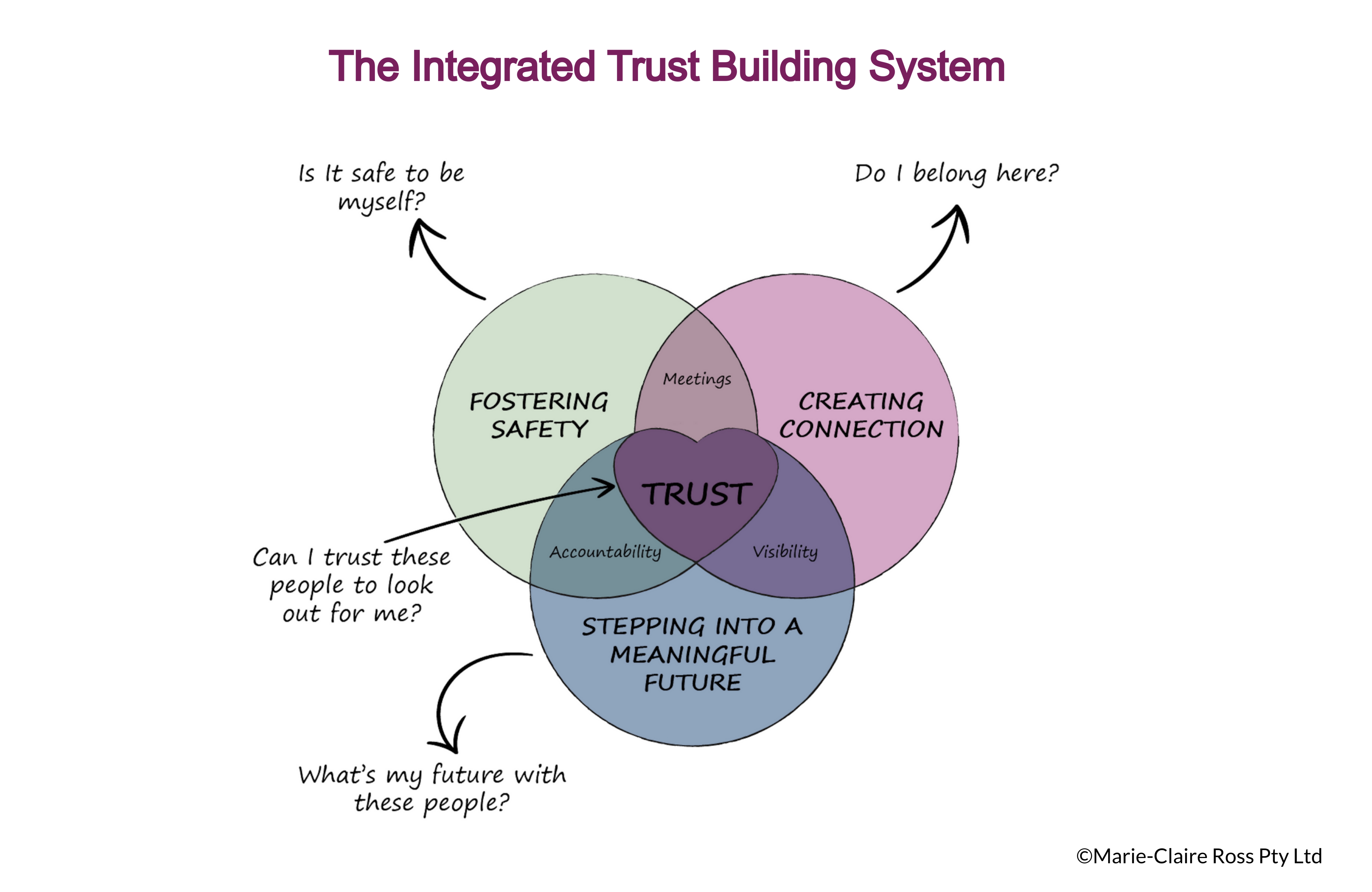8 min read
Beyond the "Why": 5 Coaching Secrets to Unlock Curiosity in Leadership
When my daughter was 17 months old, she discovered a superpower: the word “Why?”For the next two years, it was her response to almost everything.
Develop leaders, strengthen executive teams and gain deep insights with assessments designed to accelerate trust and performance.

Transform how your leaders think and perform with keynotes that spark connection, trust and high-performance cultures.

Explore practical tools, thought-leadership and resources to help you build trusted, high-performing teams.

Trustologie® is a leadership development consultancy founded by Marie-Claire Ross, specialising in helping executives and managers build high-trust, high-performing teams.

4 min read
Marie-Claire Ross : Updated on September 29, 2021

One-on-ones meetings might seem like a management fad, but the truth is they are one of the most effective ways to build trust with your direct reports.
Any business relationship is a social contract between one or more people. Both parties are responsible for the effectiveness. You take the higher ground - demonstrating and demanding accountability with how people need to behave and deliver work. While employees do the best work they can and play nicely with others. This requires breaking through people’s individualistic, protective tendencies that can go against team performance.
To do this we need to have clear and honest two-way dialogue. Checking in regularly with employees to communicate mutual expectations, required behaviours, project scope and a shared understanding of what client success looks like.
Often, leaders or managers will tell me that they have stopped doing one-on-one's because they don't have the time. It's a common trap and one to avoid because not doing them will cost you more time down the track.
In my research within organisations, I often find that companies that have leaders who do regular one-on-ones always have less people or communication problems than those who don't do them.
Let's go through 12 reasons why you need to love one-on-ones.
1. They save you time - A critical role of a manager or team leader is to look for ways to make things truly better in your department. Every hour of your day should be spent increasing the output or the value of the output of the people you’re responsible for. As Andy Grove said in the iconic book, High Output Management, your productivity as a manager, is the productivity of your team. Grove called this managerial leverage. The impact of what managers do to increase the output of their teams.
Essentially, high managerial productivity is a combination of choosing to perform tasks that possess high leverage and elicit peak performance from the individuals within the team.
Meetings and one-on-ones are both high leverage activities for team leaders. They help you more effectively both gain and share information, make decisions, influence others and model core workplace behaviours.
2. They help you build strong connections to your direct reports - One of the top reasons employees leave their job is when they have a poor relationship with their boss. One-on-ones helps circumvent this issue. Regular, scheduled time demonstrates that you are there for them. They also provide a wonderful opportunity to learn more about one another.
3. They provide clear two-way communication - Humans need certainty and communication is all about reducing ambiguity. Without it, we tend to not trust a situation and become fearful. The result is that employees pull back their full commitment. A regular one-on-one provides your direct report with the opportunity to ask questions and better understand what they are doing and why. They are also great for introverts or new starters who might be too shy to ask questions in a team meeting.
4. They improve performance - The aim of one-on-ones is to enable you to have honest conversations with your direct reports, so you can flag performance and behavioural issues without any resistance. That's because one-on-one's work most effectively where it is all about your direct report (not about you telling them stuff). And showing that you are there to help them grow - providing guidance when their performance goes off track and aligning them to the vision. It also ensures that you clear up any confusion, so that they are working on the right things.
5. They improve accountability - One-on-ones are critical to improving individual performance because they are an opportunity for you to make people accountable (and be accountable, as well). The best one-on-ones are where you effectively become a coach and accountability partner to each of your reports. Making it clear what you expect, what success looks like and timelines. It can also stop any perception of micromanagement on your part, as they are scheduled check-in. Thereby, reducing any intrusive tendency to interrupt them and provide unnecessary advice.
6. It shows that you care - We don't trust people who don't care about us. Demonstrating that you support employees helps their wellbeing, confidence and job fulfilment. A good one-on-one shouldn't be just about work. It should also help employee navigate both their personal and work lives.
7. It helps you model the right behaviours - You are constantly being watched by your direct reports. They look to you as to what behaviours are acceptable in the organisation, clues on how to best work with you and evidence that you model the company values. One-on-ones can work towards helping employees understand you better, company values and how you model those.
8. Makes you more effective - Importantly, one-on-ones benefit you enormously. As Andy Grove said in The High-Output Manager, the main benefit of the one-on-one is exchanging information and mutual education. By discussing specific problems and situations, the supervisor teaches his direct report decision-making and problem solving skills and the best way to approach issues. Simultaneously, the team member provides detailed information about what she’s doing and her concerns. It increases autonomy and sense of mastery, reducing dependency on you.
9. It improves motivation - Research from Right Management found that two-thirds of the factors that motivate performance at work are tied to career conversations and development opportunities. Rather than doing standard six month or annual performance reviews, companies that train managers to deliver career conversations and development opportunities more effectively have 29% higher revenue, lower turnover and talent acquisition costs, and stronger customer loyalty. Yet, 68% of managers are not engaged in their team’s development.
10. It reduces the need for performance reviews - Few managers like doing performance reviews. Conversations are often forced and superficial. And it’s made worse if employees do not clearly understand their goals or what is expected of them at work. One-on-ones get around this issue because they are friendly, regular conversations that ensure no-one is caught unaware with performance issues.
11. They reduce the power imbalance between a boss and direct report - Humans beings are often subconsciously aware of power discrepancies between themselves and others. We automatically don’t trust those who are in a more powerful position than us because they can potentially harm us. A well-run one-on-one treats direct reports like their opinions matter and that they are valued by their boss. Over time, it can reduce the perceived power differential threat.
12. Solve problems before they become unsolvable - Humans often don't like to tell their boss about any potential issues for fear of facing retribution. Telling people to speak up about issues on its own isn't enough. Sometimes people don't realise that they aren't speaking up because of previous bad work experiences. At its core, it's about creating an environment of trust. Having regular one-on-ones with each of your direct reports, coupled with regular team meetings works towards employees feeling that they can trust you. And let you know about issues before they become full-blown disasters.
While one-on-ones take time to prepare and run (initially), long term they save you time and enable your team to work faster and cohesively. They can also improve your job fulfilment through closer work relationships where you can see you are really having a positive impact. Not just with each individual, but also your team's collective performance.

8 min read
When my daughter was 17 months old, she discovered a superpower: the word “Why?”For the next two years, it was her response to almost everything.

11 min read
I have a friend who often finds herself at the mercy of her emotions. Recently, she called me to rehash a confrontation she’d had with a group of...

9 min read
True leadership presence isn’t a performance or a set of charisma hacks; it is the felt experience of who you are being in the room. By cultivating...

One on ones serve as a powerful tool for fostering stronger, more trusting relationships with each of your team members.

In last week's article, I talked about why you need to love one-on-ones. They really are such a powerful trust and connection building tool with your...

We all know how wonderful it is to be around positive people. Optimism is contagious. People are naturally drawn to visionary leaders who paint an...